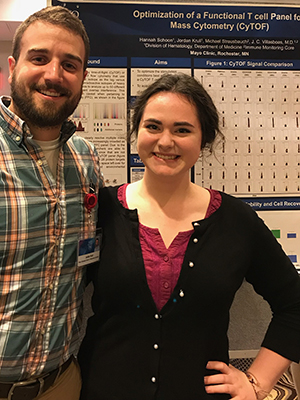Hannah Schoon, ’19, Co-Authors Paper with Mayo Clinic Lab
November 2, 2018
By Jake Weber

Hannah Schoon (right) with a colleague presenting cytometry research at the Mayo Clinic. Schoon, a senior majoring in biochemistry with a minor in cell/molecular biology, is the daughter of David and Patti Schoon of Canton, Ill., and a graduate of Canton High School.
Hannah Schoon, ’19, expected to spend this past summer becoming a technician of sorts for a highly specialized piece of research equipment (a mass cytometer) at the Mayo Clinic. That job got interrupted—and as a result, Schoon is co-author of a paper published this month in the prestigious Blood Cancer Journal.
“It seems surreal,” says Schoon. “I’m not that 4.0 perfect student; those are the ones who get papers.”
Schoon isn’t all that far from “perfect”; she was chosen by Mayo via a National Science Foundation research grant. But a schedule conflict for her original research supervisor meant that Schoon needed to join another group in the Mayo Clinic’s Immunology Department. Dr. Kerstin Wenzl was asked to add research to a paper she had already submitted for publication. Wenzl needed some quick help, just when Schoon needed a project.
Wenzl and her team had discovered that the occurrence and severity of non-Hodgkin’s lymphoma (non-HL) seems linked to two different gene mutations. This put patients into four different groups (no mutation, mutation 1, mutation 2, both mutations) which, Wenzl believed, would not respond equally to any given therapy. Schoon was tasked with evaluating how different non-Hodgkin’s lymphoma samples responded to treatment with ibrutinib, the current standard therapy of choice for non-HL.
Working in a biohazard room, Schoon assisted with experiments centered around the non-HL cell lines with mutations. After running the tests in triplicate, Schoon was able to confirm that indeed, Wenzl’s findings were valid.
This finding, Schoon says, may lead to new and more effective therapies targeted more precisely to patients with and without those mutations.
And even with the happy surprise of a published paper on her undergraduate CV, “I did get to work on my original project, too,” Schoon notes. “I didn’t get as far as I had hoped with it, but I still got to see an impact with my work. It was a good summer.”